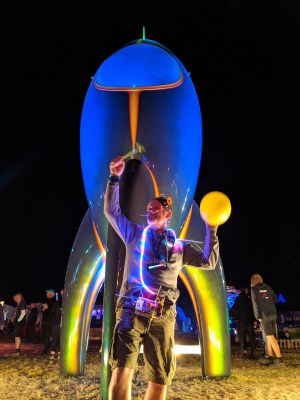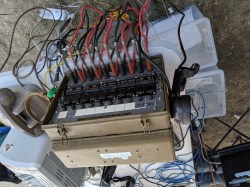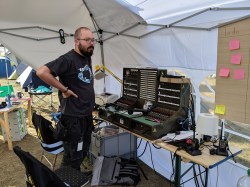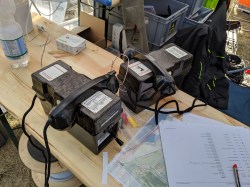What do hackers do on vacation? What do hackers do whenever they have free time? What do you love to do? That’s right. But how much more fun would it be if you could get together with 5,000 other hackers, share your crazy projects and ideas, eat, drink, dance, swim, and camp out all together for five days, naturally with power and Internet? That’s the idea of the Chaos Communication Camp, and it’s a once-in-four-years highlight of hacker life.
Held not too far outside of Berlin, the Camp draws heavily on hackers from Europe and the UK, but American hackers have been part of the scene since almost the beginning. (And Camp played an important role in the new-wave hackerspaces in the US, but that’s another story.) It’s one thing to meet up with the folks in your local hackerspace and work together on a project or brainstorm the next one, but it’s entirely a different thing when you’re drawing on hackers from all over the world. There was certainly more to see and do at Camp than you could in a month, not to mention in only five days, and this could be overwhelming. But if you dig in, the sense of community that came from shared effort and shared interests was the real take-home. And nearly everything at Camp should have its own article on Hackaday.
A Five-Day Rave
First, let’s clear up any misconceptions about the word “camp” here. This is not your Ralph Waldo Emerson solitude-of-nature type camping. CCCamp is an intentional mix of early 90s open-air techno parties with computer dorkery. A high-power disco ball turns a stand of trees into an enchanted forest. The outdoor laser show down by the marina had a fantastic liquid sky laser effect, and I have no idea how much fogging fluid was being used. There were more than a few bars, a couple clubs, a room full of pinball machines, and blinking lights that can surely be seen from outer space.
But there was also a lake for swimming, trees under which one could sit to get out of the sun and recompile GNURadio, and some fantastic kids’ playgrounds and equipment. Mike and I needed someplace quiet to record a podcast episode and we took refuge in a clay pre-processing plant. (The park where Camp was held is an abandoned brick-manufacturing plant, now a museum and recreational area.) There were dedicated quiet zones, both for camping and hacking. In short, you could escape the rave if you wanted to. What little sleep I got, though, I got with earplugs.
Sitting Around the Electric Campfire
Anecdote time! After a moderately long evening of wandering around, drinking, dancing, and talking, our small troop ended up back at the hardware hacking area. Ole had just finished a badge-hacking workshop, and had electrodes attached to his temples so that you could track his left-right eye movements on the badge from the muscle activity. Kliment was cleaning up from a day of surface-mount soldering classes. Felix was there with his awesome self-aware network synthesizer that had drawn us into conversation the day before over lunch. It turns out he knew some of the other folks in our group, and they spent some time reminiscing. We finally got the lowdown on the autonomous techno-making cart that we’d been hearing around camp for the last few days, and I was pouring grappa shots. Next door, the Belgian Embassy was making absolutely delicious fries and handing them out to all comers, following their super-secret recipe (160 °C pre-cook, rest two minutes, 180 °C until golden brown).
Everyone has their own Camp stories, but that one hour of one night sums it up for me. And this, or something like this, was happening everywhere all around Camp, all the time. Everyone brought things to share, or to work on together, or to teach. (Which is really the same thing, right?) I got to meet people whose work I respect greatly, but whom I’ve never gotten the chance to meet in person. Old friends mixed with new friends over good food and drink. One project completed inspired two or three more for the future. It was like good idea overflow, and that’s the point. How would you rather spend a vacation?
Participatory
Before Camp starts, there’s a big empty field and off in one corner by the lake is a small playground for kids who visit the brickworks museum. Over a few days, hundreds of tons of material were shipped in, transforming the entire area into a playground for slightly older kids. Have you always wanted to play around with trains? Here’s a narrow-gauge railroad for you to work with. Want to climb ridiculously high towers? Someone has to attach the microwave antenna to the top of the old smokestack. Want to learn to solder surface-mount parts like a pro? There’s a workshop for that. High voltage? You’re covered at Camp.
![IMG_20190825_021617-CCCamp2019-SATnogs @c3rotor: [chris007] and [andZ]'s twittering satNOGS](https://i0.wp.com/hackaday.com/wp-content/uploads/2019/08/IMG_20190825_021617-CCCamp2019-SATnogs.jpg?w=196&h=147&ssl=1)
But the younger kids weren’t left out either. There was a kids zone to make the adults jealous, where they also got to work on projects or play all day, with food and live children’s bands, naturally. Last time, in 2015, one of the kids’ projects was to build a wood-fired brick oven to make pizza in. It was still useable this Camp, so they had to make air rockets and POV poi instead, but at least they got to eat good pizza. As a father myself, it makes me tremendously happy to see the little hackers running around getting dirty with duct-tape stickers and their parents’ phone numbers on the back. I’m bringing my son next time.
The most amazing aspect of Camp is that it’s almost entirely volunteer run. The Angel system was largely the same as at the Chaos Communication Congresses, which take place every year just before New Years. People volunteered their time, running shifts as varied as tending bar, recording or translating the talks, or providing medical assistance when needed. In exchange, Angels got a sweet t-shirt and a place in “Heaven”, where there’s full catering and other perks. Angel shifts could also be made up on the fly: if something needed doing, a quick trip to Heaven sorted that out. For instance, driving the old diesel locomotive around the tracks turned out to require some real training, not to mention sitting next to a hot engine in the mid-day sun. It became an Angel shift. Problem solved. If something needed doing at Camp, someone would do it. And if something didn’t go smoothly, you can bet that there are already plans to make it work better next time.
Communication
Returning back to the “middle C” in Chaos Communication Camp, one of the most vital projects at camp is the phone infrastructure. In Europe, wireless phones — the kind that plug into a base station that plugs into the wall — all use the DECT standard. If you’ve still got a landline in Europe, you have one or two of these kicking around. And due to some amazing open-source hackery by the Osmocom team long ago, and backend database and services from Eventphone, you could bring your phone from home, register it on the network, and you’re good to go. If a cell phone is more your style, Phone Ops were also selling SIM cards for a few euros that could get you GSM through 4G on the completely open-source base stations. Everyone who registered got a four-digit number, and that was undeniably the easiest way to reach people at Camp.
Meanwhile, the telephone exchange provided a low-tech but truly fun telephony experience. The Chaosvermittlung is an antique switchboard connected to an uncountable number of WWII-era field telephones — the kind in a metal box that you crank to ring the operator and then push to talk. They also hooked into the camp’s DECT and GSM systems, so you could place a call from a hand-cranked box, through the operator, to LTE. As far as I could tell, they had someone operating the switchboard all the time. Two friends of mine even had a line run directly to their camper. It was glorious. Incidentally, even though a phone only requires two wires, Ethernet cable was used just because it’s cheap.
Chaos Post was in full swing as well. You could mail postcards both within camp and to the outside world. The CCC even got a deal with the German post office and got custom stamps made. You had your choice between high tech and low tech: you could swing by the Post office and type out a card on one of two manual typewriters, or you could fill in a form online that would generate a physical postcard. An ad-hoc volunteer operation, chances were good that if you came by the post office you’d get put to work delivering mail to someone near your tent. Addresses read like “the green tent near the Polish village” and somehow postcards got delivered. Besides getting to wear the cool yellow Post hat, delivering mail was a great way to meet people.
Oh, and the talks! Throughout the camp, formal presentations were live-streamed to the world, and have since been edited, translated, subtitled, and made available for you on the media server. I can’t think of another conference that does video as well and as seamlessly as the Chaos crew, and their Video Operations folks were at the top of their game.

All of this was done by hackers who were doing it all just for the fun of it, though some of them also do the same for their day jobs. How often do you get to be video editor, or help run a cellphone network? Play around in the infrastructure? Wouldn’t that be cool? You’ll need training, but that’s half the point.
See You in 2023!
An event the size of Camp simply can’t take place every summer. And that’s probably okay because it makes it more special, like the Olympics or the World Cup. I was a little bit surprised when I started doing the math: this is the 20th anniversary of the Chaos Communication Camp, and it occurs every four years. That means there have been only six Camps, and yet it feels like a tradition, and it’s a beautiful tradition.
I have no idea what else is going to happen to the world in the next four years, but I can tell you where I’ll be in August, 2023. See you at Camp!
Banner photo CC-BY 4.0 by Hanno Sternberg. Thanks!





![IMG_20190823_144447-CCCamp2019-mario-kart-railcar [peterpoetz]i's mario cart](https://i0.wp.com/hackaday.com/wp-content/uploads/2019/08/IMG_20190823_144447-CCCamp2019-mario-kart-railcar.jpg?w=530&h=397&ssl=1)
![IMG_20190824_132223-CCCamp2019-hammock-rail-car [Sebi]'s rail hammock](https://i0.wp.com/hackaday.com/wp-content/uploads/2019/08/IMG_20190824_132223-CCCamp2019-hammock-rail-car.jpg?w=262&h=197&ssl=1)
![IMG_20190821_190040-CCCamp2019-kids-area-poi [overflo]'s POV poi for the kids zone](https://i0.wp.com/hackaday.com/wp-content/uploads/2019/08/IMG_20190821_190040-CCCamp2019-kids-area-poi.jpg?w=262&h=196&ssl=1)




















> hackers from Europe and the UK
I see what you did here.
As someone living in Europe it just recently came to my attention that someone could think of the British Islands not as part of Europe. Wired thougt, anyways.
For now they my be politiically connected, but by being ISLANDS completely surrounded by the north Atlantic Ocean they are not part of any continent. If we were to have another ice age and sea level were to drop more than !175 meters, England would defiietely have a land connection to Europe. The Irish sea varies from between 50 and 275 meters, so its’not clear if or where Ireland would be joined by a land bridge at that time. Maybe an oceanographer would know.
“this is the 20th anniversary of the Chaos Communication Camp, and it occurs every four years. That means there have been only six Camps, and yet it feels like a tradition, and it’s a beautiful tradition.”
So, can someone explain the numbering of the Camps?
The link in the ECG badge blog has this at the top of the page.
“Camp was wonderful, see you at 36C3”
When you see xxC3 people refer to congress not camp. Camp is like the outdoor version of congress.
36C3 in this case means 36th Chaos Communication Congress which will be in December (every year).
Congress has also been around longer than camp.
Thanks!
3C stands for CCC (Chaos Communication Club), the 36 is the number for the 36th Congress (happening indoors at the end of the year), not to be mistaken with the camp.
Looking for soundcloud for the dude who played Nintendo DS on the green channel in the stereo headphone party near 1komona
It was a wonderful event. I came with my toddler who was definitely having a blast. I even found time to hack a little during his nap times :-D
Cu all at SHA2021, the dutch version of CCCamp ( So there is every 2 years a big camp in or Germany of Netherlands. In the other years you could visit e.g. EMF camp)
Absolutely! I didn’t want to bog the post down with history, but the CCCamp was inspired by the Dutch Hacking at the End of the Universe… etc 3 Letter Camps, which are also every four summers, offset by two years.
Tim Pritlove and the Pyonen, who started the CCCamp, gave a great 20th anniversary talk:
https://media.ccc.de/v/Camp2019-10413-20_jahre_camp
It’s funny how they bag on the HEU camp a little for being aesthetically boring (“white lights and tents”) and took that as reverse-inspiration to go all techno-ravey and spend 20k on building a rocket…
I’ve never made it to EMF camp in England, which fills in the gap summers, but I really should. Almost all the people who put it on were at CCCamp, and they’re an insane bunch. And that comes from me as a recommendation.
But really, truly, the next thing you should be planning for is Supercon in November. Not nearly as crazy, but easily the highest density of great people. All killer, no filler.
We need this desperately for folks lost in the desert ot at sea afer an apocalypse and those on land who can’;t read maps or signs.